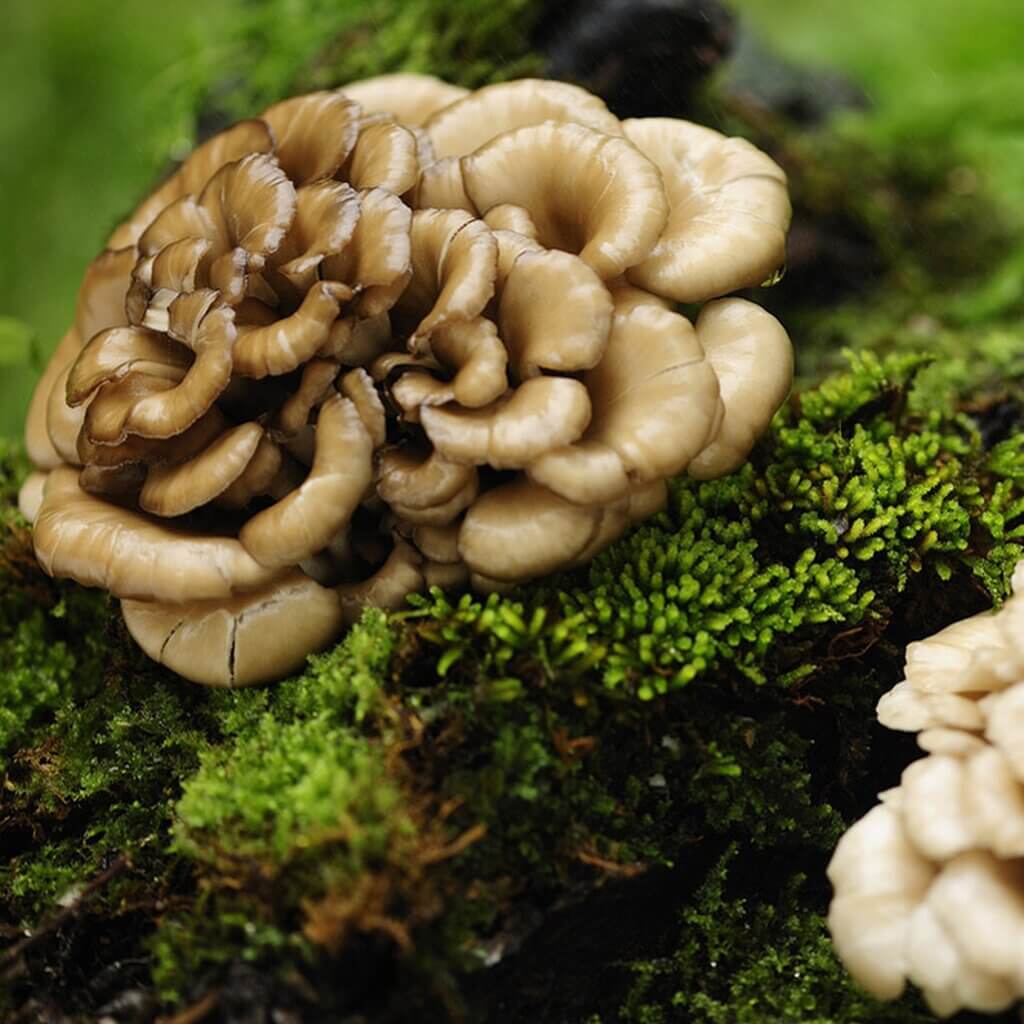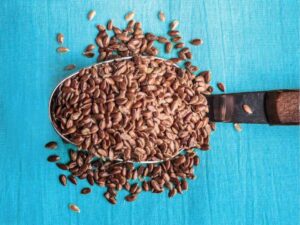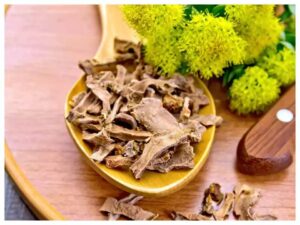The Discovery of Grifola Frondosa
Introduction
Grifola frondosa, also known as hen-of-the-woods or maitake, is a type of mushroom that is native to Asia and North America. It has been used for centuries in traditional Chinese and Japanese medicine for its health benefits. In recent years, it has gained popularity in the West for its potential to boost the immune system and fight cancer. But how was this remarkable mushroom first discovered? In this article, we’ll explore the history of Grifola frondosa and its journey from obscurity to scientific curiosity.
Traditional Use in Chinese Medicine
Grifola frondosa has been used in traditional Chinese medicine for centuries. It was first recorded in the Tang Materia Medica, a Chinese medical text from the 7th century, where it was listed as a treatment for stomach ailments, digestive issues, and obesity.
The mushroom was also valued for its ability to boost the immune system and fight infections. It was often prescribed for patients with chronic diseases, such as tuberculosis and cancer, as a way to improve their overall health and well-being.
Traditional Use in Japanese Medicine
Grifola frondosa also has a long history of use in traditional Japanese medicine. It was first recorded in the Engishiki, a Japanese medical text from the 10th century, where it was listed as a treatment for high blood pressure, diabetes, and liver disease.
The mushroom was also prized for its ability to boost the immune system and fight cancer. It was often used in conjunction with other traditional medicines, such as reishi and shiitake mushrooms, to create a powerful tonic for overall health.
Discovery in the West
Despite its long history of use in Asia, Grifola frondosa remained relatively unknown in the West until the 1980s. This changed when a Japanese researcher named Hiroaki Nanba began studying the mushroom and its potential health benefits.
Nanba was interested in the immune-boosting properties of Grifola frondosa and began conducting experiments to test its effectiveness. He found that the mushroom contained a complex polysaccharide called beta-glucan, which was responsible for its ability to stimulate the immune system.
Nanba’s research sparked interest in Grifola frondosa in the West, and scientists began to study the mushroom in more detail. They found that it had a range of potential health benefits, including its ability to fight cancer, lower cholesterol, and improve liver function.
Current Research
Today, Grifola frondosa is the subject of ongoing research in the West. Scientists are studying the mushroom’s potential to fight cancer, boost the immune system, and improve overall health and well-being.
One area of research has focused on the mushroom’s ability to fight cancer. Studies have shown that Grifola frondosa contains compounds that can inhibit the growth and spread of cancer cells, particularly in breast and prostate cancer.
Other studies have looked at the mushroom’s ability to improve the immune system. Research has shown that Grifola frondosa can stimulate the production of white blood cells, which are responsible for fighting infections and diseases.
Finally, researchers are also studying Grifola frondosa’s potential to improve overall health and well-being. Studies have shown that the mushroom can lower cholesterol levels, improve liver function, and reduce inflammation throughout the body.
Conclusion
Grifola frondosa, also known as hen-of-the-woods or maitake, is a remarkable mushroom with a long history of use in traditional Chinese and Japanese medicine. Its immune-boosting properties have made it the subject of ongoing research in the West, where scientists are studying its potential to fight cancer, improve immune function, and promote overall health and well-being. While Grifola frondosa remained relatively unknown in the West for many years, the research of Hiroaki Nanba and others has helped to bring attention to its potential health benefits. Today, Grifola frondosa is a popular supplement and food ingredient, valued for its potential to boost the immune system, fight cancer, and improve overall health. As research continues, it is likely that we will uncover even more benefits of this fascinating mushroom.
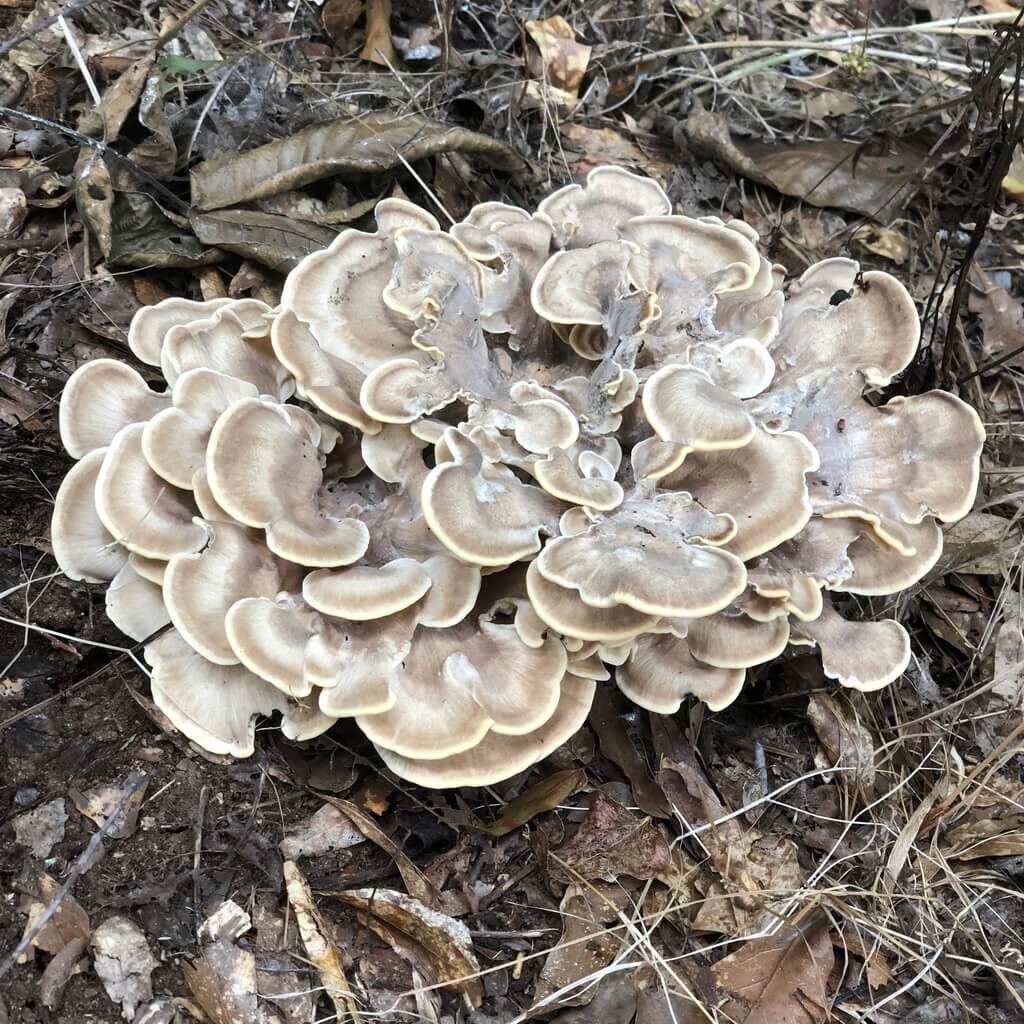
Benefits of Grifola Frondosa for Health
Boosting the Immune System
One of the most well-known benefits of Grifola frondosa is its ability to boost the immune system. The mushroom contains a complex polysaccharide called beta-glucan, which has been shown to stimulate the production of white blood cells, which are responsible for fighting infections and diseases.
Research has shown that Grifola frondosa can increase the activity of natural killer cells, which are a type of white blood cell that attacks and destroys cancer cells. It has also been shown to enhance the production of interleukin-2, a protein that helps regulate the immune system.
Fighting Cancer
Grifola frondosa is also known for its potential to fight cancer. Studies have shown that the mushroom contains compounds that can inhibit the growth and spread of cancer cells, particularly in breast and prostate cancer.
One study found that Grifola frondosa can increase the activity of natural killer cells and stimulate the production of cytokines, which are molecules that help regulate the immune system. This can help to prevent the growth and spread of cancer cells.
Another study found that Grifola frondosa can inhibit the growth of breast cancer cells and induce cell death. The mushroom was found to be particularly effective when combined with chemotherapy drugs.
Lowering Cholesterol
Grifola frondosa may also help to lower cholesterol levels in the body. One study found that the mushroom can lower levels of LDL cholesterol, which is the “bad” cholesterol that can contribute to heart disease.
The study found that Grifola frondosa can inhibit the absorption of cholesterol in the gut, which can help to reduce levels of LDL cholesterol in the blood. The mushroom was also found to increase the activity of an enzyme called HMG-CoA reductase, which plays a role in cholesterol synthesis.
Improving Liver Function
Grifola frondosa may also help to improve liver function. One study found that the mushroom can increase the activity of certain enzymes in the liver that are responsible for detoxifying the body.
The study found that Grifola frondosa can increase the activity of glutathione peroxidase and superoxide dismutase, two enzymes that play a key role in detoxification. The mushroom was also found to reduce oxidative stress in the liver, which can help to improve liver function.
Reducing Inflammation
Grifola frondosa has anti-inflammatory properties, which can help to reduce inflammation throughout the body. Chronic inflammation is a contributing factor to a range of health issues, including heart disease, cancer, and arthritis.
One study found that Grifola frondosa can reduce inflammation in the body by inhibiting the production of pro-inflammatory cytokines. The mushroom was also found to reduce the activity of COX-2, an enzyme that is involved in the inflammatory response.
Improving Blood Sugar Control
Grifola frondosa may also help to improve blood sugar control in people with diabetes. One study found that the mushroom can improve insulin sensitivity and reduce fasting blood sugar levels in people with type 2 diabetes.
The study found that Grifola frondosa can increase the activity of an enzyme called AMP- activated protein kinase (AMPK), which plays a key role in glucose metabolism. The mushroom was also found to increase the production of adiponectin, a hormone that plays a role in regulating blood sugar levels.
Promoting Weight Loss
Grifola frondosa may also be beneficial for weight loss. One study found that the mushroom can increase satiety and reduce food intake in overweight individuals.
The study found that Grifola frondosa can increase levels of a hormone called cholecystokinin (CCK), which signals the brain that the body is full. The mushroom was also found to reduce levels of ghrelin, a hormone that stimulates appetite.
Supporting Cognitive Function
Grifola frondosa may also be beneficial for cognitive function. One study found that the mushroom can improve cognitive function in older adults.
The study found that Grifola frondosa can increase the activity of an enzyme called acetylcholinesterase, which plays a role in the production of the neurotransmitter acetylcholine. Acetylcholine is important for memory and learning, and levels of this neurotransmitter decline with age.
Other Potential Benefits
In addition to the benefits listed above, Grifola frondosa may have a range of other potential health benefits. For example, it has been shown to have antibacterial and antiviral properties, which can help to reduce the risk of infections.
The mushroom has also been shown to reduce the risk of osteoporosis by increasing bone density and reducing bone loss. Additionally, Grifola frondosa may be beneficial for people with autoimmune diseases, as it has been shown to regulate the immune system.
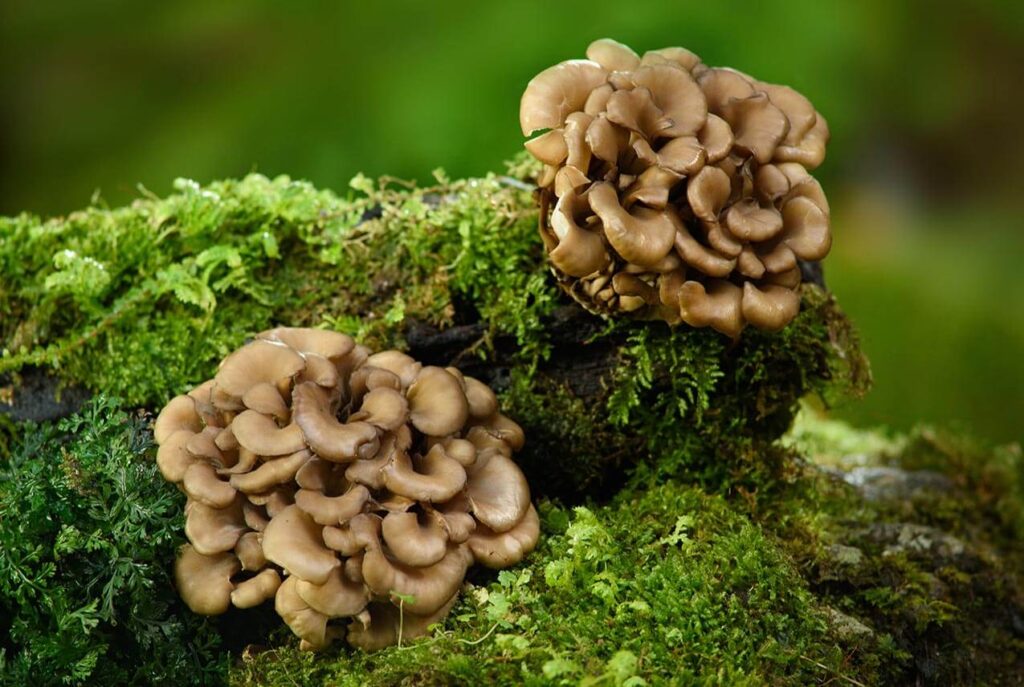
The Nutritional Components and Core Ingredients of Grifola Frondosa
Macronutrients
Grifola frondosa is a low-calorie food that is high in protein and fiber. One cup of chopped Grifola frondosa contains only 21 calories, but provides 3 grams of protein and 2 grams of fiber.
The mushroom is also low in fat and carbohydrates, making it a good choice for people who are watching their calorie intake. In addition, Grifola frondosa is a good source of complex carbohydrates, which are digested slowly and provide a steady source of energy.
Vitamins
Grifola frondosa is a good source of several vitamins, including vitamin B2, vitamin D, and vitamin K. One cup of chopped Grifola frondosa provides 0.4 milligrams of vitamin B2, which is important for energy production and metabolism.
The mushroom is also a good source of vitamin D, which is important for bone health and immune function. Grifola frondosa contains 1.6 micrograms of vitamin D per cup, which is about 16% of the recommended daily intake.
Finally, Grifola frondosa is a good source of vitamin K, which is important for blood clotting and bone health. One cup of chopped Grifola frondosa provides 10 micrograms of vitamin K, which is about 12% of the recommended daily intake.
Minerals
Grifola frondosa is a good source of several minerals, including potassium, calcium, and magnesium. One cup of chopped Grifola frondosa provides 300 milligrams of potassium, which is important for maintaining a healthy blood pressure.
The mushroom is also a good source of calcium, which is important for bone health. Grifola frondosa contains 21 milligrams of calcium per cup, which is about 2% of the recommended daily intake.
Finally, Grifola frondosa is a good source of magnesium, which is important for muscle and nerve function. One cup of chopped Grifola frondosa provides 15 milligrams of magnesium, which is about 4% of the recommended daily intake.
Polysaccharides
Grifola frondosa contains a variety of polysaccharides, which are complex carbohydrates that are important for immune function. One of the most well-known polysaccharides in Grifola frondosa is beta-glucan, which has been shown to stimulate the immune system and fight cancer.
Research has also shown that Grifola frondosa contains other polysaccharides, such as alpha-glucan and galactomannan, which may also have immune-boosting properties. These polysaccharides are thought to work by stimulating the production of white blood cells, which are responsible for fighting infections and diseases.
Amino Acids
Grifola frondosa is also a good source of several amino acids, which are the building blocks of protein. The mushroom contains all of the essential amino acids, which are amino acids that the body cannot produce on its own and must be obtained through the diet.
Grifola frondosa is particularly high in glutamine, an amino acid that is important for immune function and gut health. The mushroom also contains significant amounts of other amino acids, such as aspartic acid, alanine, and leucine.
Triterpenoids
Grifola frondosa contains a variety of triterpenoids, which are natural compounds that have anti-inflammatory and anti-tumor properties. These triterpenoids are thought to work by inhibiting the production of pro-inflammatory cytokines and promoting the production of anti-inflammatory cytokines.
One of the most well-known triterpenoids in Grifola frondosa is ergosterol, which is converted to vitamin D when exposed to sunlight. Ergosterol has been shown to have anti-cancer properties and may help to regulate the immune system.
Lectins
Grifola frondosa contains a variety of lectins, which are natural compounds that bind to sugar molecules. These lectins have been shown to have a range of potential health benefits, including anti-cancer, anti-inflammatory, and immune-boosting properties.
One of the most well-known lectins in Grifola frondosa is Maitake D-fraction, which is a protein-bound polysaccharide that has been shown to have anti-tumor properties. Maitake D-fraction has also been shown to enhance the activity of natural killer cells and stimulate the production of cytokines.
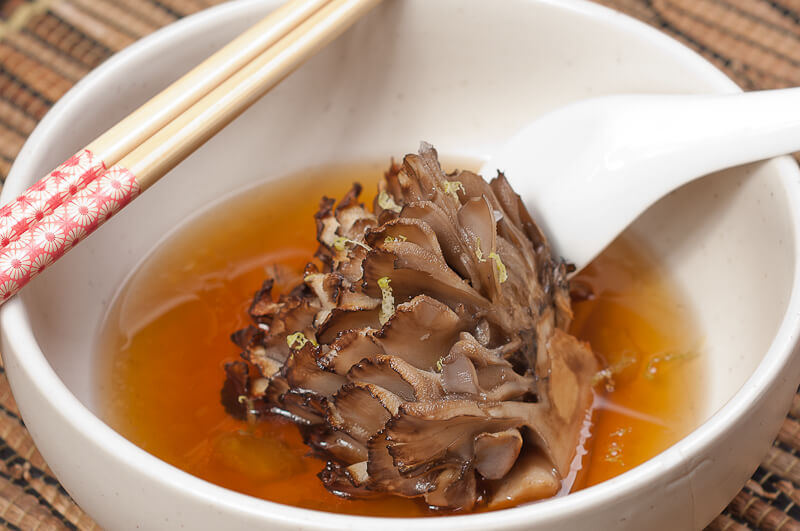
Methods for Consuming Grifola Frondosa
Fresh Grifola Frondosa
Fresh Grifola frondosa can be consumed in a variety of ways. It can be sautéed or roasted and served as a side dish or added to soups and stews. Fresh Grifola frondosa can also be chopped and added to salads for a crunchy texture and earthy flavor.
When selecting fresh Grifola frondosa, look for mushrooms that are firm and dry with a fresh, earthy smell. Avoid mushrooms that are slimy or have a foul odor, as they may be spoiled.
Dried Grifola Frondosa
Dried Grifola frondosa is a popular way to enjoy the mushroom, as it has a long shelf life and can be easily stored. Dried Grifola frondosa can be rehydrated by soaking in water for 30 minutes to an hour before cooking.
Once rehydrated, dried Grifola frondosa can be sautéed, roasted, or added to soups and stews. Dried Grifola frondosa can also be ground into a powder and added to smoothies or used as a seasoning for meats and vegetables.
Grifola Frondosa Extracts
Grifola frondosa extracts are a popular way to consume the mushroom for its medicinal properties. These extracts are typically made from the fruiting body of the mushroom and contain high levels of polysaccharides, triterpenoids, and other beneficial compounds.
Grifola frondosa extracts are available in a variety of forms, including capsules, powders, and tinctures. They can be taken as a dietary supplement to boost the immune system, fight cancer, and improve overall health.
When selecting a Grifola frondosa extract, look for a reputable brand that uses high-quality ingredients and has been third-party tested for purity and potency.
Grifola Frondosa Tea
Grifola frondosa tea is a traditional way to enjoy the mushroom for its health benefits. The tea is typically made by steeping dried Grifola frondosa in hot water for several minutes.
Grifola frondosa tea can be enjoyed on its own or mixed with other herbs and spices for added flavor. It is a soothing and warming beverage that can help to reduce inflammation and promote overall health.
Grifola Frondosa Supplements
Grifola frondosa supplements are a convenient way to consume the mushroom for its health benefits. These supplements are typically made from the fruiting body of the mushroom and may contain high levels of polysaccharides, triterpenoids, and other beneficial compounds.
Grifola frondosa supplements are available in a variety of forms, including capsules and powders. They can be taken as a dietary supplement to boost the immune system, fight cancer, and improve overall health.
When selecting a Grifola frondosa supplement, look for a reputable brand that uses high-quality ingredients and has been third-party tested for purity and potency.

Potential Side Effects and When to Avoid Taking Grifola Frondosa
Allergic Reactions
Some people may be allergic to Grifola frondosa or other types of mushrooms. Symptoms of an allergic reaction may include hives, itching, swelling, and difficulty breathing. In severe cases, an allergic reaction can cause anaphylaxis, which is a life-threatening condition.
If you have a known allergy to mushrooms, it is best to avoid consuming Grifola frondosa. If you experience any symptoms of an allergic reaction after consuming Grifola frondosa, seek medical attention immediately.
Blood Sugar Control
Grifola frondosa has been shown to help lower blood sugar levels in some people. While this is generally a positive effect, it can be problematic for people who are already taking medications to lower their blood sugar levels.
If you are taking medication for diabetes or have a history of low blood sugar, talk to your healthcare provider before taking Grifola frondosa or any other supplements or medications that may affect blood sugar levels.
Autoimmune Diseases
Grifola frondosa may stimulate the immune system, which can be beneficial for some people. However, for people with autoimmune diseases such as multiple sclerosis, lupus, or rheumatoid arthritis, an overactive immune system can be problematic.
If you have an autoimmune disease, talk to your healthcare provider before taking Grifola frondosa or any other supplements or medications that may affect the immune system.
Bleeding Disorders
Grifola frondosa may have anticoagulant properties, which means it may help to prevent blood clots. While this is generally a positive effect, it can be problematic for people who have bleeding disorders or are taking medications that affect blood clotting.
If you have a bleeding disorder or are taking medications that affect blood clotting, talk to your healthcare provider before taking Grifola frondosa or any other supplements or medications that may affect blood clotting.
Medication Interactions
Grifola frondosa may interact with certain medications, including blood thinners, blood sugar-lowering medications, and immunosuppressants. If you are taking any medications, talk to your healthcare provider before taking Grifola frondosa or any other supplements or medications.
Conclusion
Grifola frondosa is generally considered safe for most people, but there are some potential side effects and interactions to be aware of. Allergic reactions, blood sugar control, autoimmune diseases, bleeding disorders, and medication interactions are all factors to consider before taking Grifola frondosa or any other supplements or medications.
If you have any concerns about taking Grifola frondosa or any other supplements or medications, talk to your healthcare provider. They can help you determine the best course of action based on your individual needs and health status.
The Drug Interactions of Grifola Frondosa
Introduction
Grifola frondosa, also known as hen-of-the-woods or maitake, is a type of mushroom that is valued for its potential health benefits. While it is generally considered safe for most people, there are some potential drug interactions to be aware of. In this article, we’ll explore the drug interactions of Grifola frondosa.
Blood Thinners
Grifola frondosa may have anticoagulant properties, which means it may help to prevent blood clots. While this is generally a positive effect, it can be problematic for people who are taking blood thinners such as warfarin, heparin, or aspirin.
If you are taking a blood thinner, talk to your healthcare provider before taking Grifola frondosa or any other supplements or medications that may affect blood clotting.
Diabetes Medications
Grifola frondosa has been shown to help lower blood sugar levels in some people. While this is generally a positive effect, it can be problematic for people who are already taking medications to lower their blood sugar levels.
If you are taking medication for diabetes, talk to your healthcare provider before taking Grifola frondosa or any other supplements or medications that may affect blood sugar levels.
Immunosuppressants
Grifola frondosa may stimulate the immune system, which can be beneficial for some people. However, for people who are taking immunosuppressant medications such as cyclosporine, tacrolimus, or corticosteroids, an overactive immune system can be problematic.
If you are taking an immunosuppressant medication, talk to your healthcare provider before taking Grifola frondosa or any other supplements or medications that may affect the immune system.
